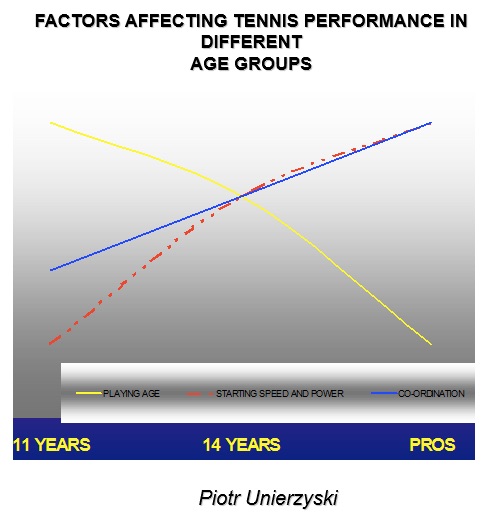The Power of Practise
Time practising
A study into Tennis by Piotr Unierzyski looking at Factors affecting tennis performance in different age groups shows that the biggest effect on playing performance in tennis 11and under is playing age, so the number of tennis hours they have achieved. As they get older for top players the starting speed and co-ordination is what is most key at the top of the game as all have played 1000’s hours of tennis.
For under 12 the experiences and opportunities to learn will come from the parents involvement in there out of school activities. The more time you do any thing the better you will become. So it is vitally important that these opportunities are given to the child. If these chances are not provided by the parents for there children by the time they get to 12 and have the independence to do more by them selfs and spend more time trying to specialise at a sport there original potential from birth has reduced by half if they have done nothing. The ages to maximise your co ordination for life is from birth to 12. This is the window where you need to do different physical challenges for the brain and neural pathways to reach there potential.
You get some people that are referred to as natural sports person. They can turn there hand to any sport, they are really talented. This is the wrong way to look at it. Yes they have achieved higher levels than others but if you were asked who would be better at something the person who has spent 100 hours doing it or 5? You would not call the person with 100 hours more naturally talented.
There is a now a commonly accepted 10,000 rule to master something, this is seen in sport and in music. A study into Berlin’s violin school to find out the difference between the violinists that would become teachers, be part of orchestra or a lead violists. The results were clear to be seen, the hours spent by each group were the same, the teachers had put in 3-4000 hours, all the lead violinists had over 10,000 hours and in the orchestra in between. Some notable examples of 10,000 hour rule is Mozart, a fire fighter in Chicago and Cristiano Ronaldo .
Mozart son of two musicians was brought up with music from when he was born, he had done his 10,000 hours by the age of 12 compared to most who achieve this feat by 18-25. The fire fighter in Chicago an experienced head of his team, on entering a fire that appeared to be normal not long after entering he ordered his whole team out. Not long after the house fell in on it’s self. After being interview he did not know why he made the decision but had a feeling something was wrong. In fact what had happened was the main fire was in the basement causing it to be much more dangerous. With out realising the different temperature, the different sounds and smoke even though subtle was enough for him to get a bad feeling about it. With out the experience he would not of picked up the cues.
Ronaldo the Portuguese footballer did some experiments in a Nike documentary, one of the experiments had a corner kicked in to him with Ronaldo starting at the edge of the penalty box then Ronaldo running in and heading into the goal. But while the ball was half way to him the lights were switched off he was still able to head the ball into the goal. Ronaldo was able to better this by being able to achieve the same result even when the light was turned off just after they kicked the ball. The most impressive however was left till last, the light was turned off a split second before the ball was kicked. Ronaldo was not able to head the ball but was able to chest the ball into the goal.
These examples show how thousands of hours of practise allows the brain to make connections and understanding of situations. This allows them to achieve feats that other people just could not achieve unless they have put in the same amount of hours.
What allows them to achieve these feats is the hours doing what they excel at. These hours create a data base of experiences that are stored in the brain that can be used understand future situations quicker. When seeing a situation it is there perception skills that speeds up the understanding. Perception works from the top down in the brain, the top is the prior experiences and bottom relates to the incoming senses. This allows people with more experience to make sense and understand faster what the incoming senses allowing them to be able to predict what is will happen.
To play more this summer please visit the coaches page to see the options for groups this summer to play more. As a member you have the options of the social nights to play through the summer as well, or come down and play with family and friends to have fun and enjoy improving

